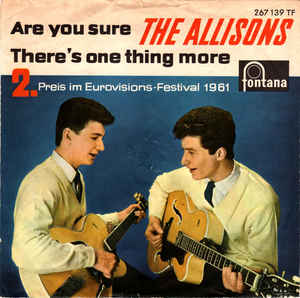
The Eurovision Song Contest 1966 was the 11th edition of the annual Eurovision Song Contest. It took place in Luxembourg City, Luxembourg, following the country's victory at the 1965 contest with the song "Poupée de cire, poupée de son" by France Gall. Organised by the European Broadcasting Union (EBU) and host broadcaster Compagnie Luxembourgeoise de Télédiffusion (CLT), the contest was held at the Villa Louvigny on 5 March 1966 and was hosted by Luxembourgish television presenter Josiane Chen.
The United Kingdom held a national preselection to choose the song that would go to the Eurovision Song Contest 1962. It was held on 11 February 1962 and presented by David Jacobs.
Milan "Danijel" Popović, better known simply as Daniel, is a Montenegrin-Croatian pop singer.

Yugoslavia participated in the Eurovision Song Contest 27 times, debuting in 1961 and competing every year until its last appearance in 1992, with the exceptions of 1977–1980 and 1985. Yugoslavia won the 1989 contest and hosted the 1990 contest.

Serbia has participated in the Eurovision Song Contest 16 times since making its debut in 2007. Serbia previously participated as part of Yugoslavia and as Serbia and Montenegro (2004–2006). Serbia won the contest on its debut as an independent country in 2007, with "Molitva" by Marija Šerifović. The country's other top five results are third place in 2012 with "Nije ljubav stvar" by Željko Joksimović, and fifth place in 2022 with "In corpore sano" by Konstrakta. Serbia's other top ten results are sixth place (2008) and tenth place (2015).

"Nous les amoureux" is a song recorded by French singer Jean-Claude Pascal with music composed by Jacques Datin and French lyrics written by Maurice Vidalin. It represented Luxembourg in the Eurovision Song Contest 1961 held in Cannes, resulting in the country's first ever win at the contest.

Camillo Jean Nicolas Felgen was a Luxembourgish singer, lyricist, disc jockey, and television presenter, who represented Luxembourg in the Eurovision Song Contest 1960 and in 1962.

"Addio, addio" was the Italian entry in the Eurovision Song Contest 1962, performed in Italian by Claudio Villa.
Yugoslavia participated for the last time in the Eurovision Song Contest 1992, held in Malmö, Sweden as the Federal Republic of Yugoslavia. The last Yugoslav representative was Extra Nena with the song "Ljubim te pesmama".
Yugoslavia was present at the Eurovision Song Contest 1962, held in Luxembourg, Luxembourg.
Yugoslavia participated for the first time at the Eurovision Song Contest 1961, held in Cannes, France.
The following lists events that happened during 1962 in the Grand Duchy of Luxembourg.
The Netherlands was represented by six-member group Teach-In, with the song "Ding-a-dong", at the 1975 Eurovision Song Contest, which took place in Stockholm on 22 March. Teach-In were chosen as the Dutch representatives at the national final on 26 February, and went on to win the 1975 contest for the Netherlands.

"Are You Sure?" is a song by British pop duo The Allisons, that represented the United Kingdom at the Eurovision Song Contest 1961, performed in English.

Jacques Datin was a French composer.
Yugoslavia took part in the 1983 Eurovision Song Contest held in Munich, West Germany. It was represented by Daniel who sang Džuli.
Serbian pop is the pop music scene of Serbia. From the 1940s until the 1980s, while Serbia was a constituent republic of Socialist Federal Republic of Yugoslavia, Serbian pop scene was a part of the SFR Yugoslav pop scene.
Yugoslavia was present at the Eurovision Song Contest 1968, held in London, United Kingdom.
Yugoslavia was present at the Eurovision Song Contest 1963, held in London, United Kingdom.
Yugoslavia was represented at the Eurovision Song Contest 1969, held in Madrid, Spain, by an act that ended in 13th place.







